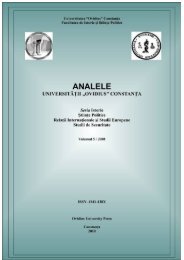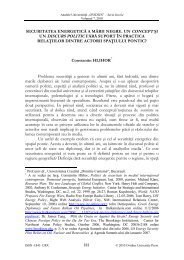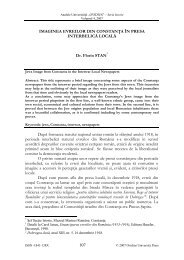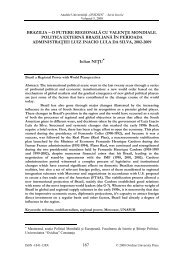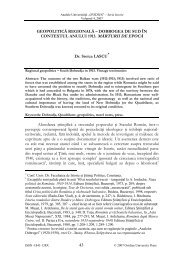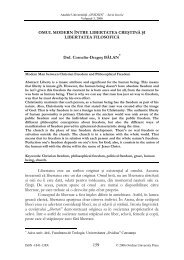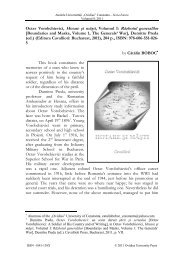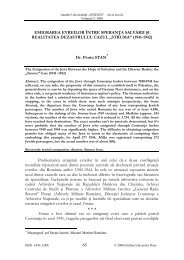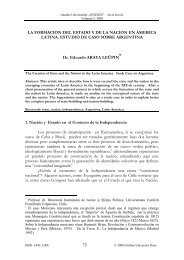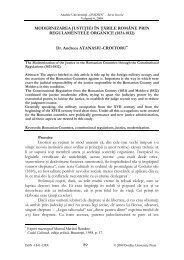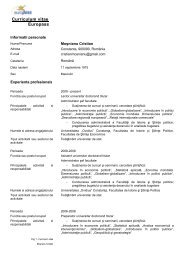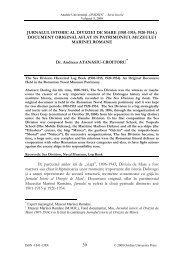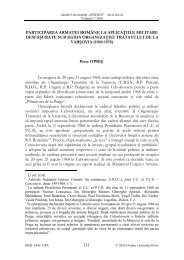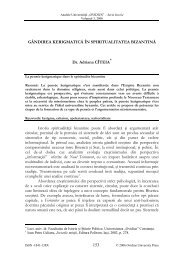analele universitÄÅ£ii âovidiusâ constanÅ£a - AUOCSI
analele universitÄÅ£ii âovidiusâ constanÅ£a - AUOCSI
analele universitÄÅ£ii âovidiusâ constanÅ£a - AUOCSI
You also want an ePaper? Increase the reach of your titles
YUMPU automatically turns print PDFs into web optimized ePapers that Google loves.
Luiza Filimon / Analele Universităţii „OVIDIUS” / Vol. 6/ 2009<br />
are estimated to have emigrated between 1989 and 2001, the vast majority to<br />
Italy and Greece. The number of Albanians permanently or temporarily resident<br />
in Greece, Italy, the US and Germany was estimated, in 2001, at 438,000,<br />
173,000, 45,000 and 12,000 respectively. In 2005, the Ministry of Interior of<br />
Greece placed the number at 362,472 34 .<br />
Moreover, in the Western Balkans, the possibility of European<br />
integration has served to grately diminish security risks, yet some of states<br />
continue to suffer from weak indigenous institutions that lack the capacity to<br />
manage essential political, economic, and social functions, while potentially<br />
critical domestic and regional ethnic tensions dwell just below the surface.<br />
Throughout the region, improper rule of law mechanisms allow corruption and<br />
organized crime to develop and flourish. In short, most of the states in the<br />
Balkans region are transitional where political and economic transformations –<br />
and in some cases fundamental questions of national security – still remain<br />
unresolved and incomplete 35 .<br />
Seen from another perspective, however, the glass may be nearer to half<br />
full. The region has made progress towards the establishment of democratic and<br />
market-oriented institutions, and their prospects for inclusion in Euro-Atlantic<br />
institutions have increased. Apart from unsettled statehood issues concerning<br />
Montenegro and Kosovo, the Western Balkans have – at varying speeds –<br />
continued to solidify state structures and shift their attention toward fulfilling<br />
the criteria for EU membership 36 .<br />
At this far extreme, the report issued by the UNODC , in March, 29,<br />
2008, clearly states how the Balkans have become a low-crime region after the<br />
turmoil of conflict and violence that resulted from the process of postcommunist<br />
transition and the break-up of Yugoslavia. Executive Director of<br />
UNODC, Antonio Maria Costa said that the vicious circle of political instability leading<br />
to crime, and vice versa that plagued the Balkans in the 1990s has been broken 37 .<br />
Surprisingly, “Crime and Its Impact on the Balkans“ also shows that, in<br />
general, levels of crime against people and property (like homicide, robbery,<br />
rape, burglary, and assault) are lower than in Western Europe, and the number<br />
of murders is falling throughout the region. This positive trend has been<br />
particularly noticeable in the past few years. Even the number of Balkan<br />
nationals being held in Western European prisons has gone down 38 .<br />
34 Crime and its Impact on the Balkans and affected countries. Report conducted by the<br />
United Nations Office on Drugs and Crime (UNODC), p. 45, accessed: November, 23, 2009,<br />
at: http://www.unodc.org/documents/data-and-analysis/Balka<br />
n_study.pdf.<br />
35 I. Kempe, K. Klotzle, op. cit.., p 8.<br />
36 Ibidem, p. 12.<br />
37 Crime and its Impact on the Balkans and affected countries, p. 5<br />
38 Ibidem, p. 35.<br />
ISSN -1841-138X 86 © 2009 Ovidius University Press



